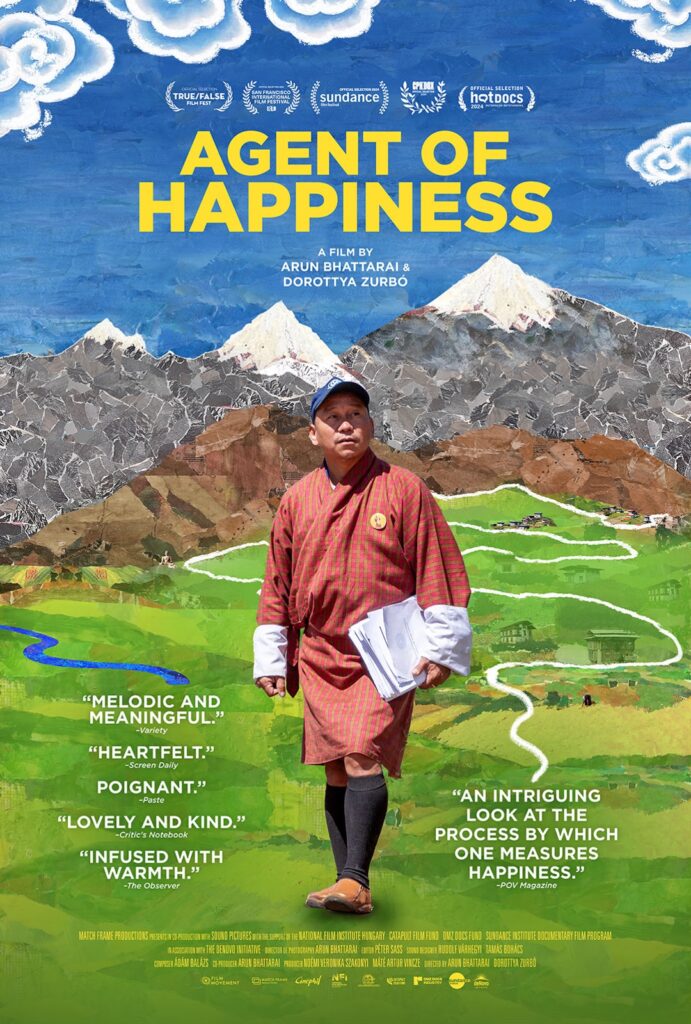‘Agent of Happiness,’ a Look at Bhutan, Is Cinéma Vérité With a Nod to Fiction’s Conventions
Film depicts efforts to track the country’s Gross National Happiness — an official directive instituted in the latter part of the 1970s as a means by which policy could be shaped.

A documentary by Arun Bhattarai and Dorottya Zurbó, “Agent of Happiness,” takes place in the kingdom of Bhutan. If you’re one of the many Westerners who know the country only tangentially, if at all, that was once how the Bhutanese preferred it.
Wedged between Communist China and India, Bhutan is, in terms of size, a tad smaller than Switzerland with a population of some 727,000 citizens. The ferocity by which the “Land of the Thunder Dragon” was protective of its sovereignty held true until the 1970s, after which the powers-that-be began to allow entry to world travelers and curiosity seekers. Adherents of Buddhism and the environmentally minded — Bhutan is, apparently, the only extant carbon-negative country — are particularly keen on the place.
The current head of state, the 44-year old Jigme Khesar Namgyel Wangchuck, is part of a monarchy established in 1907. The “People’s King” took the helm upon his father’s abdication in 2008 and has seen fit to institute democratic reforms. Bhutan is chummy with its former protector, India, and on strained-but-polite terms with its neighbor to the north: China and Bhutan signed off on a policy to keep peace at the border. Radio came to Bhutan in 1973; television and the internet in 1999.
As much as a movie-goer needs a historical grounding in Bhutan when watching “Agent of Happiness,” it’s worth knowing that the government and a Nepalese minority haven’t always seen eye-to-eye — which has sometimes resulted in violence and sometimes in the exodus of ethnic Nepalis. Our protagonist, Amber Gurung, refers to his disenfranchisement at several key points during the picture. This scion of Nepalese heritage needs to become an official Bhutanese citizen in order to travel abroad. We gather that it’s a tall order.

Which hasn’t prevented the government of Bhutan from hiring Mr. Gurung as a census taker of a sort. Working with a partner, Guna Raj Kuikel, Mr. Gurung travels to the country’s faraway reaches in order to collect information about the happiness of its population. Getting a gauge on the GNH — that is to say, Gross National Happiness — is an official directive instituted in the latter part of the 1970s as a means by which policy could be shaped.
Items on the GNH questionnaire range from mundane matters like goat and tractor ownership to those of an existential nature. “Do you ever feel that some things are impossible to do?” is one. Ranking your karma on a scale of 1-to-10 is another.
Just how happy Mr. Gurung might be is evident shortly into the run of “Agent of Happiness.” He’s a forty-something bachelor who lives at home with his elderly mother, for whom he serves as a caregiver. Eager for companionship, Mr. Gurung finagles an outing with a younger woman he met online, Sarita Chettri. Before the cake and cappuccino can arrive at the table on their first date, Mr. Gurung pops the question. Ms. Chettri is circumspect in her reaction. She likes her winsome suitor even as she turns down his proposal of marriage.
All the while, Mssrs. Gurung and Kuikel tootle along by car through Bhutan, singing along to pop hits of yore and musing on the prerequisites of a happy life. They interview an eccentric and melancholy panoply of citizens. There’s a teenage girl worried about her mother’s drinking; a transgender woman who dances at a local nightclub; a man seeking spiritual succor after the death of his wife; and a polygamist whose happiness knows no bounds. His three wives aren’t quite so happy. When the filmmakers get the trio alone, each woman has choice words to say about their husband. It’s a rich and funny scene.
“Agent of Happiness” is best considered cinéma vérité that has a foothold in the conventions of fiction: there are narrative aperçus here that will beg the credulity of even the most charitable of souls. Any qualms that arise are mild when compared to the gentleness of the film’s ministrations and to the humor and kindness at its core. However distant or odd or exotic Bhutan might seem, Ms. Zurbó and Mr. Bhattarai place their focus on the ineradicable commonalities we all share, however bittersweet or disappointing they may prove to be.
Charming and profound is a tough combination to pull off. “Agent of Happiness” is an understated winner.

